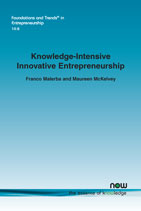Knowledge-Intensive Innovative Entrepreneurship
By Franco Malerba, Bocconi University, Italy, franco.malerba@unibocconi.it | Maureen McKelvey, University of Gothenburg, Sweden, maureen.mckelvey@handels.gu.se
Abstract
The interplay between innovation, knowledge and entrepreneurship constitutes a major driver of the economic, social and cultural development in modern societies and has major implications for public policy. To understand these broad trends, a novel literature on knowledge-intensive innovative entrepreneurship has recently emerged. In this book we provide a presentation of the key concepts, the relevant empirical findings and the main specific insights. We take a Schumpeterian, evolutionary and innovation system view of entrepreneurship, knowledge and innovation. In the conceptual framework proposed in this book, knowledge-intensive innovative entrepreneurs are involved in the creation, diffusion and use of knowledge; introduce new products and technologies; draw resources and ideas from the innovation system in which they operate; and introduce change and dynamism into the economy. This volume provides detailed insights into the progress made in defining and understanding knowledge-intensive innovative entrepreneurship both theoretically and empirically; in discussing the current analytical understanding and empirical evidence; and in proposing the key directions and topics for future research.
Knowledge-Intensive Innovative Entrepreneurship
This monograph examines knowledge-intensive innovative entrepreneurship (KIE). The emerging literature on KIE stresses the relevance of the knowledge-based economy, the central position of innovation in modern industries and services and the essential role of new firms in the economic growth of countries. Therefore, Knowledge-Intensive Innovative Entrepreneurship puts forward the argument that KIE enables a modern view of entrepreneurship that links the intense use of knowledge by new ventures with an intense innovative activity related to the economy and markets.
The positioning of the emerging literature on KIE has been done relative to three starting points. First, this monograph focuses primarily upon economic aspects of entrepreneurs and entrepreneurship; second, the emerging literature on KIE builds upon a Schumpeterian tradition of the importance of the entrepreneur and of innovations in the dynamics of the economy and the role of knowledge in entrepreneurship; and third this monograph focuses upon innovation systems related to innovation. Following the introduction, this monograph volume is divided into three parts as follows. Part II focuses upon issues related to KIE including theory, definitions, and measurements. Part III focuses upon understanding KIE and the evidence on KIE. Finally, Part IV focuses upon a process model and on future research directions.
